Description

List of the 5 largest food producers in Germany
The food industry stands between agriculture and food trade. With more than 6,000 companies, over 600,000 employees and an annual turnover of around 180 billion euros, it is an important German sector of the economy. Most food companies are medium-sized. But there are also a few big players. These are the five largest in Germany.
1. Südzucker AG, Mannheim
The name says it all. Südzucker is the largest sugar producer in Germany and worldwide. The company emerged from the merger of 5 southwest German sugar factories in 1926 to form Süddeutsche Zucker AG. Over time, Südzucker achieved its leading position through organic growth and the acquisition of additional sugar factories in Europe. Sugar production is still the core business. Südzucker has more than 19,000 employees. This makes Südzucker one of the most important food producers in Germany.
Update 2023: After a mixed year last year, Südzucker AG remains on track for growth in fiscal 2022/2023. At the beginning of the year, the group announced its figures for the first three quarters of the fiscal year and posted significant gains in both revenues and earnings. The sugar segment in particular posted a significant improvement in earnings.
Update 2024: At the end of 2023, it is announced that Südzucker intends to acquire 100% of its subsidiary CropEnergies in a first step and delist it from the stock exchange in a second step. Completion is expected in 2024.
2. Deutsches Milchkontor GmbH (DMK), Zeven
DMK is one of the largest German dairy companies and was created in 2011 from the merger of Nordmilch AG and Humana Milchindustrie GmbH. Despite the GmbH legal form, DMK is organised as a cooperative. Its owners are around 7,000 active milk producers and cooperatives from 12 German states. Dairy products, cheese, ice cream, but also baby food, dietetics, health products and special feed are part of DMK’s product range. The company has over 20 locations – mainly in Germany – and employs around 7,000 people. This makes DMK one of the most important food producers in Germany.
3. Dr. Oetker GmbH, Bielefeld
Many people still associate the brand Dr. Oetker with baking and pudding powder, in fact Dr. Oetker today generates more sales with frozen pizza. The food activities of the Oetker Group are bundled in Dr. Oetker GmbH. This includes Dr. August Oetker Nahrungsmittel KG for the Group’s branded goods companies. These include the subgroups Coppenrath & Wiese, Agrano and the Martin Braun Group. They represent a broad range of food products Around 16,000 employees work under the umbrella of Dr. Oetker GmbH.
4. Nestlé Deutschland AG, Frankfurt/Main
Nestlé Germany is the German subsidiary of the Swiss Nestlé Group. With an annual turnover of more than 90 billion US dollars, it is the world’s largest food company. The German share of sales is around 3 percent. Nestlé Germany has almost 10,000 employees and stands for a wide range of well-known branded products in the areas of chocolate and confectionery, milk products, hot drinks, baby food, kitchen products and cereals. Examples of well-known Nestlé brands: Maggi, Thomy, Nesquik, Nescafé, Sanpellegrino, Vittel, After Eight, Kitkat – the list could go on.
5. FrieslandCampina Germany GmbH, Heilbronn
FrieslandCampina Germany is the German subsidiary of Koninklijke FrieslandCampina, a Dutch group with an international focus that focuses on dairy products. With 24,000 employees and a turnover of 11.6 billion euros (2018), Koninklijke FrieslandCampina is one of the largest dairy groups in the world. FrieslandCampina Germany is the successor to the former Südmilch AG. Well-known brands on the German market are Landliebe, Tuffi, Chocomel, Frico and Holland Master.
This information is included in the database
- Company name
- General contact data (address, e-mail address, telephone number, URL)
- Name of the management
- Serial letter suitable for addressing the management (e.g. “Dear Dr. Müller”)
- Sales figures for the years 2021, 2020, 2019, 2018, 2017, 2016 and 2015 (taken from the annual and consolidated financial statements)
- Employee figures for the years 2021, 2020, 2019 and 2018 (taken from the annual and consolidated financial statements)
- Sector classification & Field of activity
Note: If the sales and employee figures are not included in a company’s own financial statements but in the parent company’s consolidated financial statements, the data from the respective consolidated financial statements are provided.

These industries are covered by our list
- Dairies (e.g. Molkerei Alois Müller GmbH & Co KG, DMK Deutsches Milchkontor GmbH)
- Beverage producers & breweries (e.g. Radeberger Gruppe KG, Gerolsteiner Brunnen GmbH & Co KG)
- Meat product manufacturers (e.g. Edeka Südwest Fleisch GmbH, Tönnies Lebensmittel GmbH & Co KG)
- Bakeries (e.g. Harry-Brot GmbH)
- Ready-to-eat meals (e.g. Dr. August Oetker Nahrungsmittel KG)
- Confectionery manufacturers (e.g. Ferrero Deutschland GmbH)
- Coffee & tea (e.g. Alois Dallmayr KG)
- Food chemistry (e.g. C. Thywissen GmbH, Stern-Wywiol Gruppe GmbH & Co KG)
- Fish (e.g. iglo GmbH, heristo holding gmbh)
- Cereals & plant products (e.g. GETREIDE AG)
- Wine & spirits (e.g. Mast-Jägermeister SE)
- etc.
Picture sources: Peter Bond, nrd via Unsplash
Map: Food companies headquarters

Food manufacturers by federal state
The ResearchGermany database of the largest German food producers allows to get some interesting insights about the food industry in Germany. Bavaria, Northrhine-Westfalie, Lower Saxony and Baden-Württemberg are the most important federal states when it comes to food companies. The distribution can be seen in the graph below.
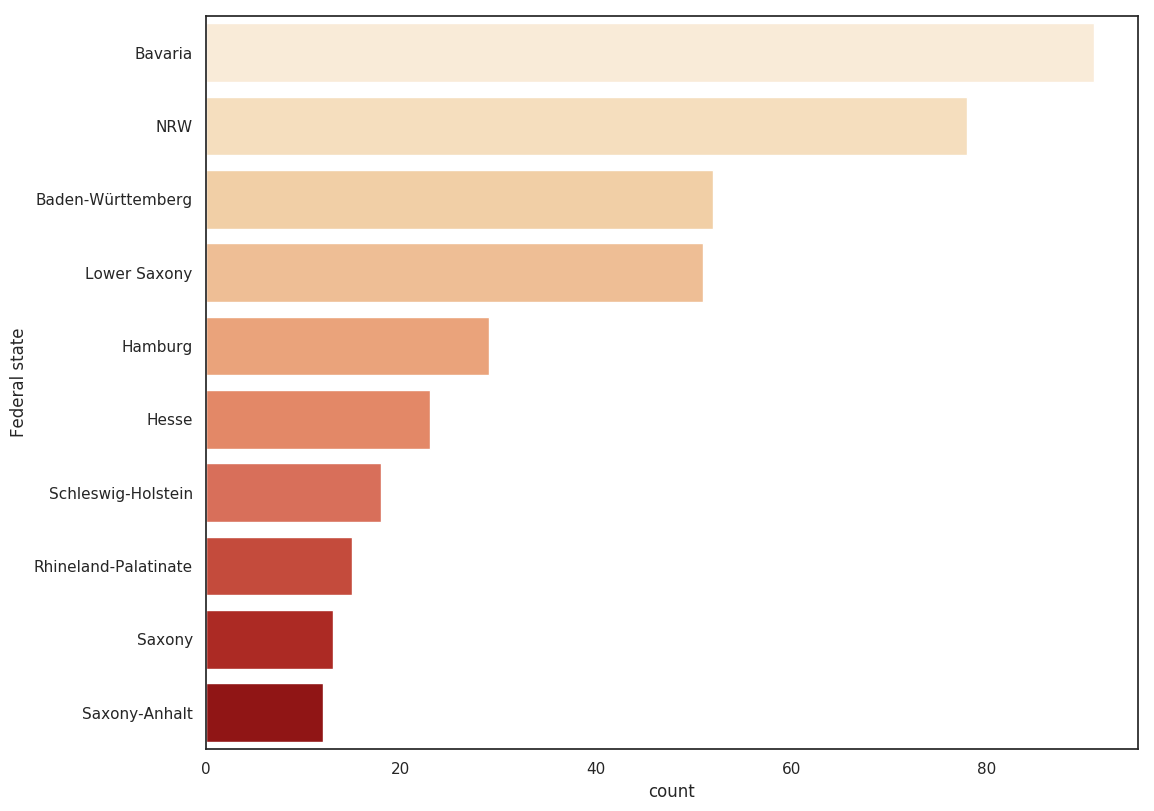
The German food industry: Statistics and facts
The food industry is one of the largest employers and most important economic sectors in Germany. Its core consists of the food industry, the food trade and the food trade (retail and wholesale). In a broader sense, it also includes agriculture (food production) and gastronomy.
The food trade and, to a lesser extent, the catering trade form the interface to the end consumer in the food value chain. In 2019, the food retail trade achieved sales of around 208.5 billion euros. It is characterized by a strong concentration. Around two thirds of the market is dominated by the five large chains Edeka, Schwarz-Gruppe (Lidl), Rewe, Aldi and Metro. The hospitality industry, which is organized on a small scale, generated sales of 89.7 billion Euro.
In 2019, the food industry generated sales of around 179.6 billion euros, the food trade 40.6 billion euros. The largest contributors to industry turnover were meat and meat products with a share of almost a quarter, followed by milk and dairy products, bakery products, confectionery and alcoholic beverages. The food industry, and even more so the food trade, is structured on a medium-sized basis. In 2019, there were a good 6,100 companies in industry and just under 33,000 in the food trade, while agriculture generated sales of 58.8 billion euros in 2019, which were generated by 295,000 companies.
With 5.72 million employees, the food industry is one of the largest employers in the country. Most of the employees work in the hotel and restaurant industry (2.392 million) and in the food retail trade (1.226 million).

Any questions? Get in touch!
Leo Semmelmann, Founder
contact [at] researchgermany.com
+49 (0) 89 92927741
We are looking forward to help you in case of any questions, remarks and individual requests. Feel free to get in touch via email, live chat or phone. We can also offer you package prices and can create individual lists.

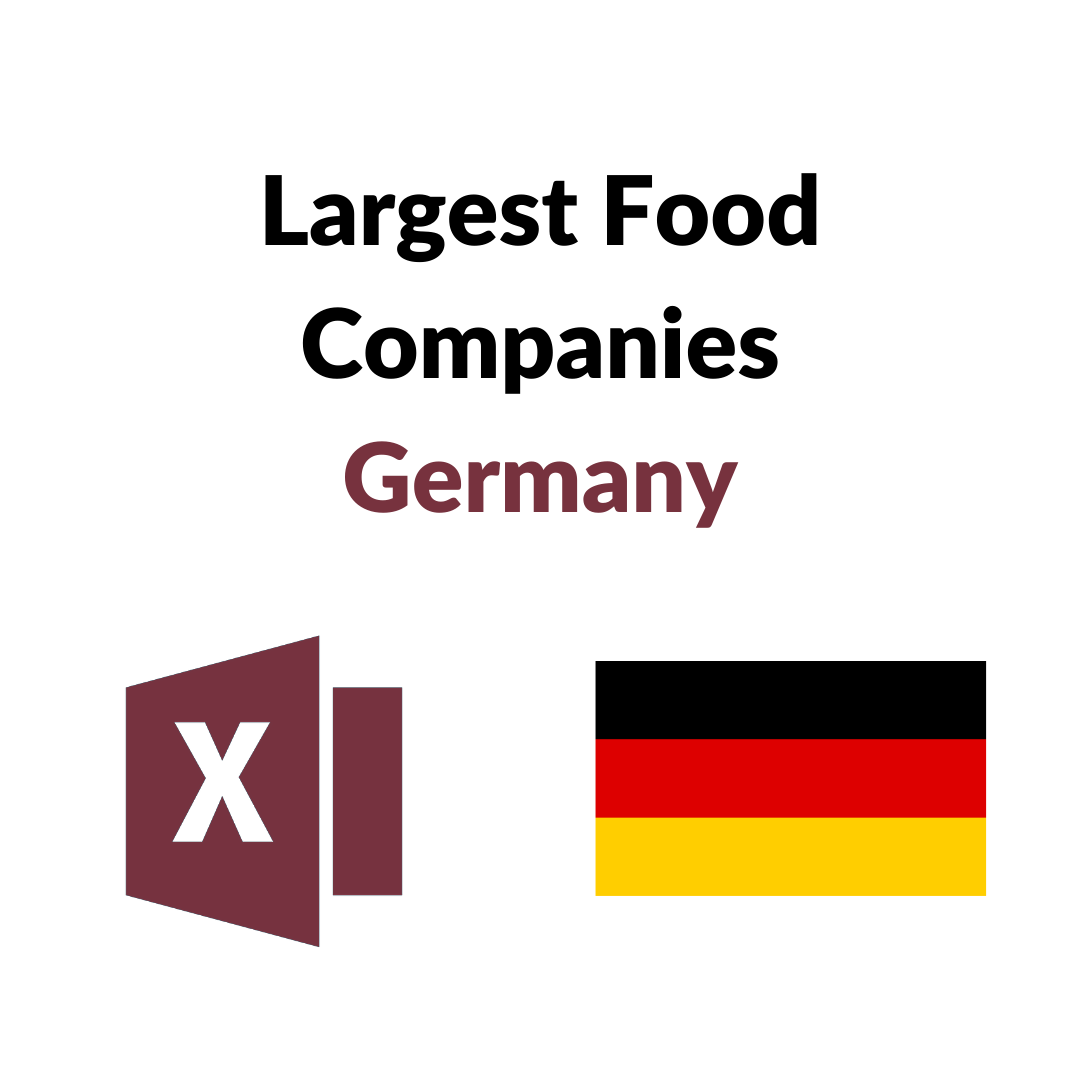
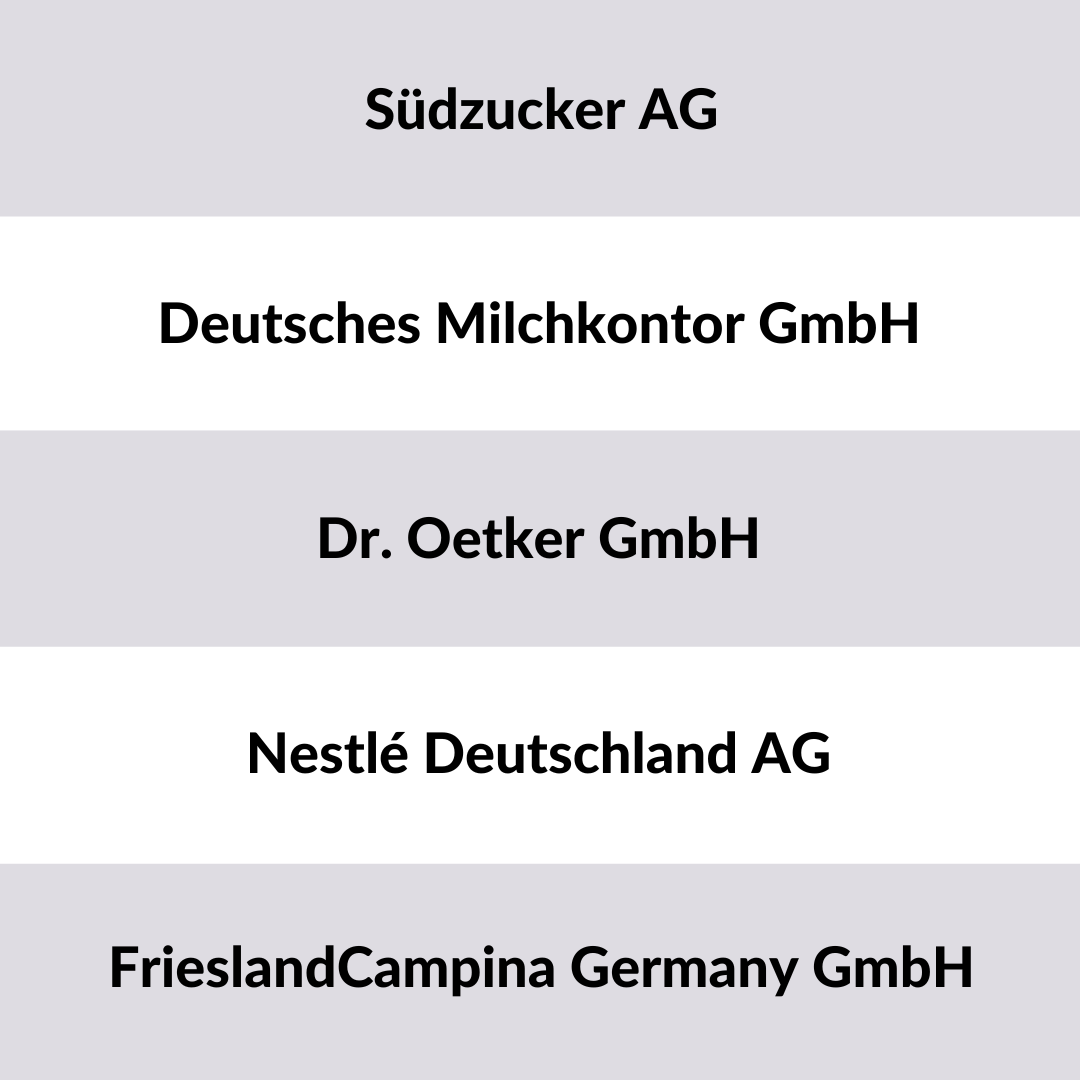
 Contains the 400 largest food producers from Germany from numerous sectors such as dairies, bakeries, meat product manufacturers, confectionery, coffee & tea, beverage manufacturers & breweries, food chemistry, fish, etc. The list is an excerpt from our
Contains the 400 largest food producers from Germany from numerous sectors such as dairies, bakeries, meat product manufacturers, confectionery, coffee & tea, beverage manufacturers & breweries, food chemistry, fish, etc. The list is an excerpt from our 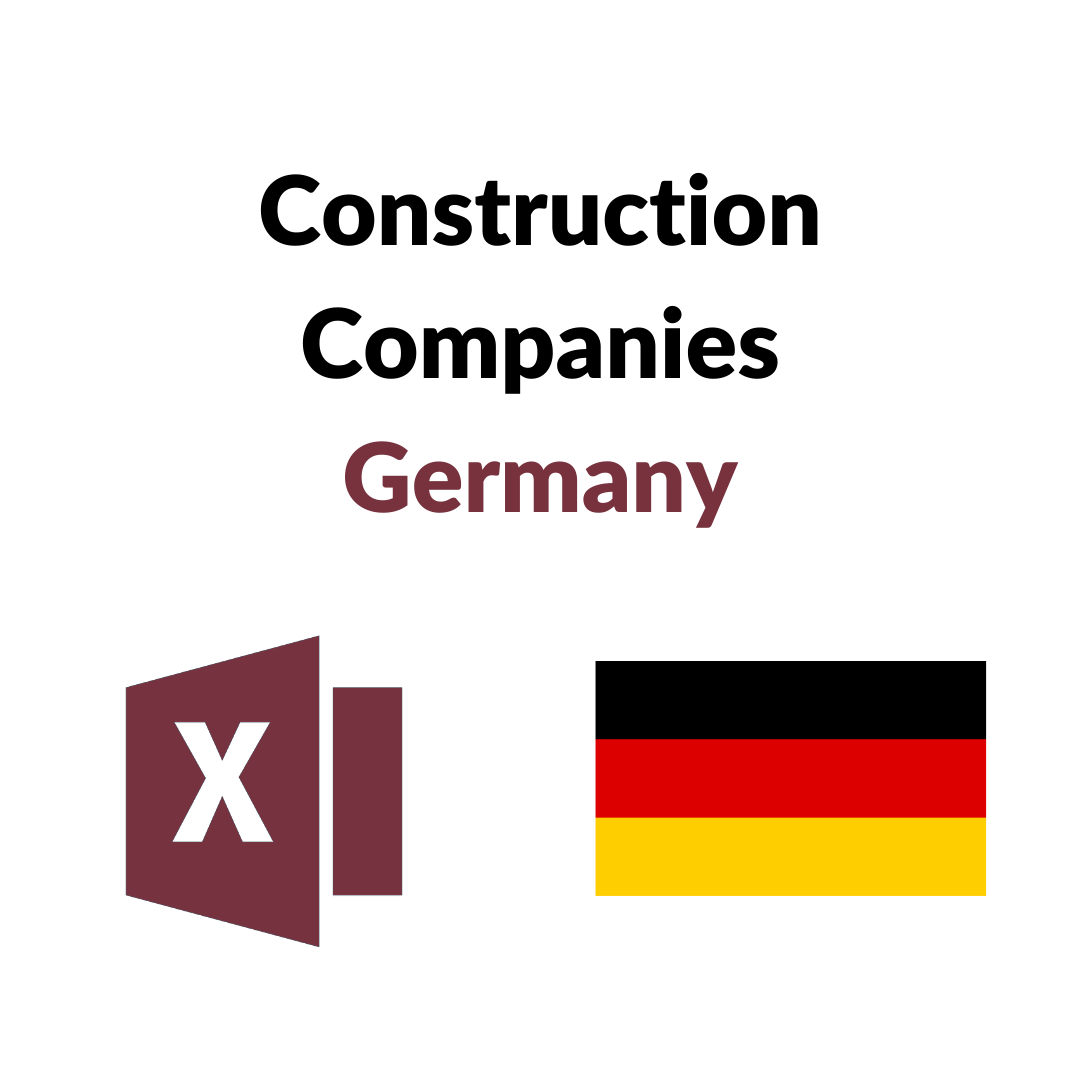
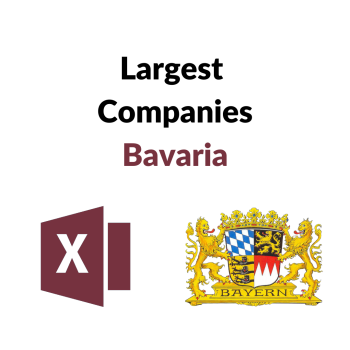
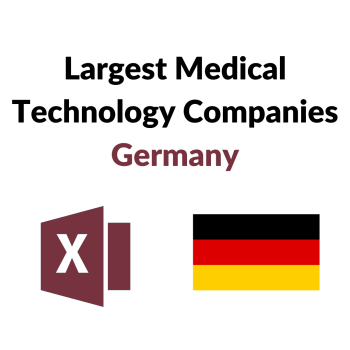
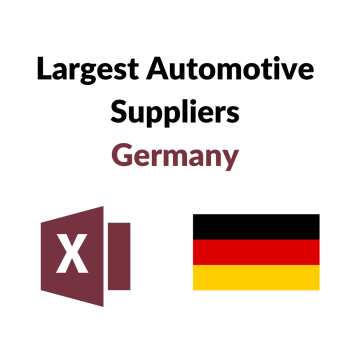
Petr W. –
Dear ResearchGermany-team, thank you a lot for your immediate support with your database of the largest food producers in Germany. We know of other service providers for lead-generation that are far from good. However, your list is of really high quality and we are working with it successfully. Best of luck with your company. Best regards, Petr